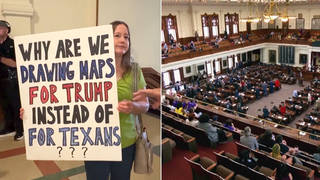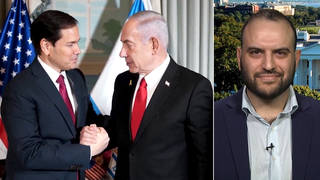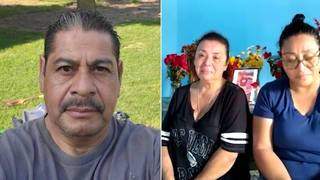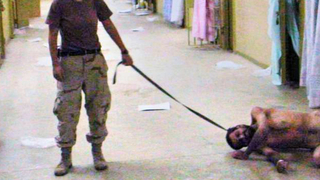
Topics
Guests
- Ann Louise Bardachcontributor to Politico magazine, where her latest piece is headlined “Prodigal Son: Marco Rubio’s Complicated Cuban Legacy.” She’s the author of several books, most recently, Without Fidel: A Death Foretold in Miami, Havana and Washington. She has reported on Cuban-Miami politics for more than 20 years.
Two of the candidates at Tuesday’s Republican presidential debate are Cuban-American: Senators Ted Cruz and Marco Rubio. We discuss Cruz and Rubio with Ann Louise Bardach, a journalist who has reported on Cuban-Miami politics for more than 20 years. Bardach is a contributor to Politico magazine, where her latest piece explores Rubio’s family ties to a Miami drug kingpin. Bardach discusses Cruz and Rubio’s questionable claims about their family histories as Cuban exiles and the challenges both candidates face over immigration reform.
Transcript
AMY GOODMAN: At last night’s debate, two of the Republicans on the stage were Cuban-American senators, Ted Cruz and Marco Rubio. Cruz talked about his Cuban roots in his closing statement.
SEN. TED CRUZ: Fifty-eight years ago, my father fled Cuba. As he stood on the deck of that ferryboat with the wind and salt air blowing, he looked back at the oppression and torture he was escaping. And yet he looked forward to the promise of America. His story is our story. What ties Americans together is we are all the children of those who risked everything for freedom.
America is in crisis now. I believe in America. And if we get back to the free market principles and constitutional liberties that built this country, we can turn this country around. I believe that 2016 will be an election like 1980, that we will win by following Reagan’s admonition to paint in bold colors, not pale pastels. We’re building a grassroots army. I ask you to join us at TedCruz.org. And we, the people, can turn this nation around.
AMY GOODMAN: To talk more about presidential candidates Ted Cruz and Marco Rubio, we’re joined by Ann Louise Bardach, who has reported on Cuban-Miami politics for more than 20 years, contributor to Politico magazine, where her latest piece is headlined “Prodigal Son: Marco Rubio’s Complicated Cuban Legacy.” She’s also the author of several books, most recently, Without Fidel: A Death Foretold in Miami, Havana and Washington.
Ann Louise Bardach, welcome back to Democracy Now! Start with Ted Cruz, and then let’s move on, move on to your more extensive piece on Marco Rubio. Tell us Ted Cruz’s background.
ANN LOUISE BARDACH: Well, Ted Cruz is half-Cuban. His father, Rafael, was born in Cuba and came here. The story has recently been contested in The New York Times to the extent that he, the father, made initial claims that he fought against Batista, that he fought with the guerrillas of Fidel Castro, you know, but basically the storyline is that he did fight against the government, or at least his sentiments were against the Batista government, and he gave the new rebels a go at it. The particulars have recently been challenged, and the degree of his activism.
But he did come to the United States. I’m not sure if the salt was in the air, as Ted Cruz told us last night, or exactly what happened on that ship, but the father did get here, and actually—and, of course, eventually settled in Canada, which is where Ted Cruz was born. The mother, on the other hand, is entirely Anglo, and so he’s half. He was not raised, like Marco Rubio, in a Cuban or a Hispanic environment and is not a fluent Spanish speaker at all. He can’t campaign in Spanish. So his background is very, very different than, say, Marco Rubio.
AMY GOODMAN: So let’s talk about Marco Rubio. You wrote an extensive piece in Politico, “Prodigal Son: Marco Rubio’s Complicated Cuban Legacy.” Tell us who Marco Rubio is. And does it differ from what—your version differ from what he says?
ANN LOUISE BARDACH: Well, Marco Rubio grew up in Cuban Miami. Again, he also had a contested family narrative. Both men have been challenged in the media about the veracity of their accounts, because, of course, both men want to be known as families of anti-Castro—anti-Castro Cubans, which is, of course, the leading demographic traditionally in South Florida. And for many years, Marco Rubio said his family came to America to flee Castro. But in fact his parents, Mario and Oriales Rubio, actually came in May of 1956. It is true that they were fleeing a tyrant, but the tyrant they were fleeing in 1956 could not have been Fidel Castro. It would be Fulgencio Batista. In fact, in 1959, after the rebels did take control, Rubio’s beloved grandfather went back to Cuba, lived and worked in Cuba for a government ministry for one or two years, and his mother went back on four different occasions. And then they made the final exodus to the United States. So they’re—they are not the traditional, what’s called the el exilio histórico, which is the exiles of Miami that became incredibly powerful, that really created the Cuban-American Miami political machine, for lack of a better word, that has turned out so many successful politicians. And of them, I would say, at this point, Marco Rubio is their most gifted scion.
AMY GOODMAN: Now, interestingly, Marco Rubio was not asked about immigration at the debate—
ANN LOUISE BARDACH: Interesting.
AMY GOODMAN: —though there was a very heated debate, and I want to turn to it and then go back to Marco Rubio. Let me go to that clip in the debate, during—when immigration came up, perhaps the most heated part of the night. Candidates were asked about the recent 5th Circuit Court of Appeals ruling upholding an earlier injunction blocking President Obama’s plan to protect up to 5 million people from deportation. You hear from John Kasich, Jeb Bush, Ted Cruz, but first Donald Trump.
DONALD TRUMP: And it was a two-to-one decision. And it was a terrific thing that happened. And I will tell you, we are a country of laws.
GOV. JOHN KASICH: Maria, can we comment on that?
GERALD BAKER: Senator—Senator Rubio—
GOV. JOHN KASICH: Can we comment on that?
GERALD BAKER: Yeah, one quick comment, yes.
GOV. JOHN KASICH: Well, look, in 1986, Ronald Reagan basically said the people who were here, if they were law-abiding, could stay. What didn’t happen is we didn’t—we didn’t build the wall effectively, and we didn’t control the border.
AMY GOODMAN: This is John Kasich.
GOV. JOHN KASICH: We need to. We need to control our border, just like people have to control who goes in and out of their house. But if people think that we are going to ship 11 million people who are law-abiding, who are in this country, and somehow pick them up at their house and ship them out of Mexico—to Mexico, think about the families. Think about the children.
So, you know what the answer really is? If they’ve been law-abiding, they pay a penalty. They get to stay. We protect the wall. Anybody else comes over, they go back. But for the 11 million people, come on, folks. We all know you can’t pick them up and ship them across, back across the border. It’s a silly argument. It’s not an adult argument. It makes no sense.
DONALD TRUMP: All I can say—
GOV. JOHN KASICH: So the fact is, all I’m suggesting, we can’t ship 11 million people out of this country. Children would be terrified, and it will not work.
MARIA BARTIROMO: Thank you.
GOV. JOHN KASICH: Somebody’s got to call the truth.
GERALD BAKER: OK, OK, thank you. You’ve had a lot—
DONALD TRUMP: I created tens of thousands of jobs.
GERALD BAKER: Mr. Trump, you’ve had a good—let me just—let’s—
DONALD TRUMP: I created tens—built an unbelievable company worth billions and billions of dollars. I don’t have to hear from this man, believe me. I don’t have to hear from him.
GERALD BAKER: Mr. Trump, Mr. Trump, you, yourself—you, yourself, said, “Let Governor Bush speak.” Governor Bush?
JEB BUSH: Thank you, Donald, for allowing me to speak at the debate. That’s really nice of you. Really appreciate that. What a generous man you are. Twelve million illegal immigrants, to send them back, 500,000 a month, is just not possible. And it’s not embracing American values. And it would tear communities apart. And it would send a signal that we’re not the kind of country that I know America is.
SEN. TED CRUZ: Now, I want to go back to the discussion we had a minute ago, because, you know, what was said was right. The Democrats are laughing, because if Republicans join Democrats as the party of amnesty, we will lose. And, you know, I understand that when the mainstream media covers immigration, it doesn’t often see it as an economic issue. But I can tell you, for a million of Americans at home watching this, it is a very personal economic issue. And I will say, the politics of it would be very, very different if a bunch of lawyers or bankers were crossing the Rio Grande, or if a bunch of people with journalism degrees were coming over and driving down the wages in the press.
AMY GOODMAN: Ted Cruz, a Texas senator, wrapping up that part of the debate. Interestingly, Ann Louise Bardach, Marco Rubio was not asked about immigration, even though he was part of the “Gang of Six” who originally proposed immigration reform in the Senate and has said now he would do away with DACA.
ANN LOUISE BARDACH: Well, I think he truly dodged a bullet last night and is probably quite grateful today. Immigration is a very tricky issue for both Cruz and Rubio, probably more Rubio. Rubio has had a history of vacillating, hesitating, equivocating responses to immigration reform. When he was in the House in Florida, he proposed some elements of the DREAM Act. And then when he ran for Senate against Charlie Crist in Florida, he just said no. He just went to completely no immigration reform. But when he got into Congress, he was a member, as you said, of the Gang of Eight, proposing a path towards citizenship. Well, the blowback from the tea party, which—you must remember that his victory in 2010 owed a great deal to the tea party, and the blowback was tremendous. He backed off, and he hasn’t come near it since. Now, it’s very tricky for him for a bunch of reasons. If what he’s advocating today were the law for his parents—remember, his parents were not Cuban exiles post-1959—they wouldn’t be in this country, what he’s proposing. It would be very different for his own family. And his family narrative of his hard-working, struggling parents is really the central narrative of his campaign.
The other issue that almost everybody in the media misses, or particularly in the Anglo media, are the nuances of this. Cuban Americans have a very special immigration policy. We call it “the Cuban exception.” They benefit from the 1966 Cuban Adjustment Act, which means if you are a Cuban, but no one else, you become entitled to all kinds of benefits that lead to permanent residency and citizenship. We also have a “wet foot, dry foot” policy here, that any Cuban that lands on U.S. soil one toe, you’re in. Now, every other immigrant from every other country gets the boot. Now, for the life of me, I cannot understand, with immigration being so important, that not at a single debate are Cruz and Marco Rubio asked this very important issue, which so impacted their own families, which is the basis of their own narrative, and really hits at a very fundamental hypocrisy with immigration law: Do we have an exception for just one ethnic group? So when you hear that the Republican Party is against a blanket amnesty, that is incorrect. They have supported a blanket amnesty, and for many decades, but for just one ethnic group. And that is Cuban Americans.
AMY GOODMAN: Ann Louise Bardach, we’re going to have to leave it there, though there is so much to talk about, we want to have you back. Ann Louise Bardach has reported on Cuban-Miami politics for more than 20 years, contributor to Politico magazine. We’ll link to her piece, “Prodigal Son: Marco Rubio’s Complicated Cuban Legacy.” She’s the author of a number of books, including Without Fidel: A Death Foretold in Miami, Havana and Washington. And thanks so much to Jamil Smith, a senior editor at The New Republic, host of Intersection, a podcast about race, gender and identity.
This is Democracy Now! When we come back, we look at the Terror in Little Saigon. You’ll come to understand what it is. Stay with us.











Media Options